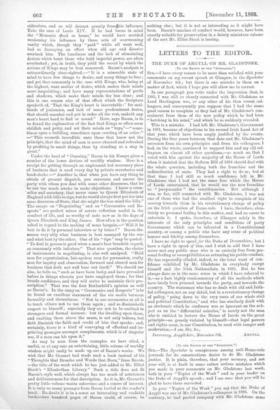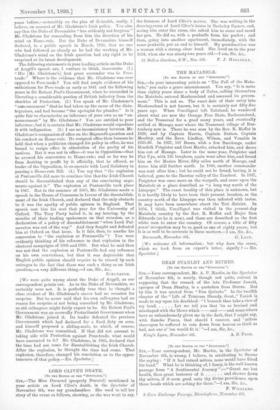[To THE EDITOR 00 THE " SPEOTATOR.1 Sin,—The Spectator is
conspicuous among anti-Home-rule journals for its conscientious desire to do Mr. Gladstone justice. It is plain, therefore, that your memory, and not your will, is at fault in some rather serious mistakes which you made in your comments on Mr. Gladstone last week, both in your "Topics of the Week" and in your leader on the Duke of Argyll's speech ; and I am sure that you will be glad to have them corrected.
In your "Topics of the Weak" you say that the Duke of Argyll was one of Mr. Gladstone's colleagues in 1885. On the contrary, he had parted company with Mr. Gladstone some years before,—ostensibly on the plea of ill-health, really, I believe, on account of Mr. Gladstone's Irish policy. You also say that the Duke of Devonshire "has evidently not forgiven" Mr. Gladstone for concealing from him the direction of his mind on Home-rule. But the Duke of Devonshire himself declared, in a public speech in. March, 1886, that no one who had followed as closely as he had the working of Mr. Gladstone's mind on the Irish question had any right to be surprised at its latest development.
The following statements in your leading article on the Duke of Argyll's speech are, I venture to think, inaccurate. (1.) "His [Mr. Gladstone's] first great surrender was to Free- trade." Where is the evidence that Mr. Gladstone was ever opposed to Free-trade ? You will find ample evidence of his enthusiasm for Free-trade as early as 1841 and the following years in Sir Robert Peel's Government, when he succeeded in liberating a considerable portion of British industry from the shackles of Protection. (2.) You speak of Mr. Gladstone's " announcement " that he had taken up the cause of the disin- tegrators, and had become "the apologist for plunder." Is it -quite fair to characterise an inference of your own as an " an- nouncement " by Mr. Gladstone ? You are entitled to your inference ; but it is certain that Mr. Gladstone would repudiate it with indignation. (3.) I see no inconsistency between Mr. Gladstone's resignation of office on the Maynooth question and his conduct on Home-rule. He resigned office then because he held that when a politician changed his policy in office, he was bound to resign office in attestation of the purity of his motives. But it was not in office—it was in Opposition—that he avowed his conversion to Home-rule; and so far was he from desiring to profit by it officially, that he offered, as leader of the Opposition, to co-operate with Lord Salisbury in passing a Home-rule Bill. (4.) You say that "the explosion at Pentonville did more to convince him that the Irish Church should be disestablished than. any of the convincing argu- ments against it." The explosion at Pentonville took place in 1867. But in the summer of 1865, Mr. Gladstone made a speech in the House of Commons in favour of the disestablish- ment of the Irish Church, and declared that the only obstacle to it was the apathy of public opinion in England. That speech cost him his seat that year for the University of Oxford. The Tory Party hailed it, in my hearing, by the mouths of their leading spokesmen on that occasion, as a declaration of a policy of disestablishment "when Lord Pal- merston was out of the way." And they fought and defeated him at Oxford on that issue. Is it fair, then, to ascribe his conversion to "the explosion at Pentonville " ? You were evidently thinking of his reference to that explosion in the electoral campaigns of 1868 and 1880. But what he said then was not that the explosion at Pentonville had any influence on his own convictions, but that it was deplorable that English public opinion should require to be roused by such outrages to the fact that there was such a thing as an Irish question,—a very different thing.-1 am, Sir., &c., SCE.IITATOR.
[We were quite wrong about the Duke of Argyll, as our correspondent points out. As to the Duke of Devonshire, we certainly were not. It is perfectly true that he thought a close student of Mr. Gladstone's career had no occasion for surprise. But be never said that his own colleagues had no reason for surprise at not being consulted by Mr. Gladstone, as old colleagues might fairly expect to be. Sir Robert Peel's Government was an avowedly Protectionist Government when Mr. Gladstone joined it. Its leader defeated the previous Government which had declared for a fixed duty on corn, and himself proposed a sliding-scale, to which, of course, Mr. Gladstone was committed. If that did not amount to taking side with Protection against Free-trade, what would have amounted to it? Mr. Gladstone, in 1865, declared that the time had not come for disestablishing the Irish Church. After the explosion, he thought the time had come. That explosion, therefore, changed his conviction as to the oppor- tuneness of that policy.—En. Spectator.]







































 Previous page
Previous page